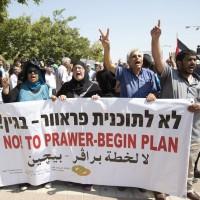
Abolish the Prawer-Begin plan! Stop racist discrimination
While putting up a "Peace Talks" show with one hand, the Netanyahu government is expanding settlements in the West Bank and declaring war on its own Arab Bedouin citizens with the other.
The Prawer-Begin plan, formally named "The law for regulation of Bedouin settlements in the Negev – 2013", already passed first reading in parliament this June, and it is planned to be brought for decisive votes around October. If legislated and put into practice by the government, it is estimated that 35 Arab Bedouin villages in the Negev/Naqab area will be demolished.
Up to 30,000 or 40,000 Arab Bedouins will be deprived of their lands and homes, without any clear alternative offered to these rural communities, other than moving to the current Bedouin towns, hit by the highest rates of poverty and neglect. This plan is the most recent expression of the racist policy carried out by Israeli governments since the establishment of the state, against the Arab-Palestinian minority that remained within Israeli borders after 1948.
The government’s propaganda, spread by mainstream media, portrays the Bedouins as illegal settlers, land thieves and criminals. But the truth is that Bedouins compose 30% of the Negev population, and demand only 5% of its land, on which they already live. It’s a minor proportion of the vast and highly unpopulated Negev area, while the Jewish population inhabits much larger lands undisturbed.
The 35 "Un-Recognized" Bedouin villages have never been supplied with basic infrastructure or public services like running water, sanitation, electricity etc. They are considered "trespassers" on state land even though some of them have existed there since long before the establishment of the Israeli state and others were ordered to move to their current location by the Israeli army during the first years of the state.
The attitude of the Israeli state towards the Bedouins exposes blunt racism. They are treated as enemies and a "demographic threat" – though this doesn’t hold back the state from cynically encouraging Bedouin youth to volunteer to the Israeli military in order to "serve the country".
This attitude and the Prawer plan have sparked a process of radicalization amongst the Bedouin communities. Their struggle was embraced by the general Arab-Palestinian minority in Israel, especially the youth. Local committees were set up by Palestinian youth in a few towns and villages. It was mainly the Palestinian youth who went out to protests and they put pressure on the "High Follow-Up Committee for Arab Citizens of Israel", representing different political factions, to call for days of action and strikes.
The calls for 2 different days of community strikes, especially in education, municipal and government services, were responded to widely by Arab-Palestinians in Israel. Large and angry protests, dominated by youth, took place and were treated with massive police repression including violent arrests, tear gas grenades, Batons and gendarmes. Significantly, solidarity protests also took place in the West-Bank and the Gaza strip.
Overcome the repression, stop the expulsions
On "Land Day" (30 March 2013), the traditional day of protest against oppression and racist expropriation of Palestinian land by the state, Socialist Struggle Movement distributed a leaflet in which we called for a mass struggle against the Prawer-Begin plan, including general strikes, mass demonstrations, the barricading of houses and villages due to be demolished and the building of democratic committees in the Bedouin communities and around the country, to plan and organize struggle, protest and propaganda work.
At the same time the government plans, through huge police force using brutal means of repression, to crush any kind of protest or civil resistance. But their ability to carry through such measures depends amongst other factors, on the scale of participation in struggle and whether an atmosphere legitimizing these kinds of actions will be created amongst the general Israeli public.

In addition to continuing to popularise and build for mass participation amongst the Bedouins and the rest of the Arab-Palestinian population, a campaign that will reach to ordinary and working Jewish people can assist in making the struggle a success. The fact that parts of the 2011 social protest movement in Israel embraced the call to recognize the "un-recognized" Bedouin villages and to start supplying them all basic public infrastructures and services, illustrates that this is also possible.
An informative campaign to expose the truth about the government’s deceitful propaganda and emphasize the basic right of housing without discrimination for all, can assist in raising further support for the struggle, weaken the government’s position and increase the chances of winning.


Be the first to comment